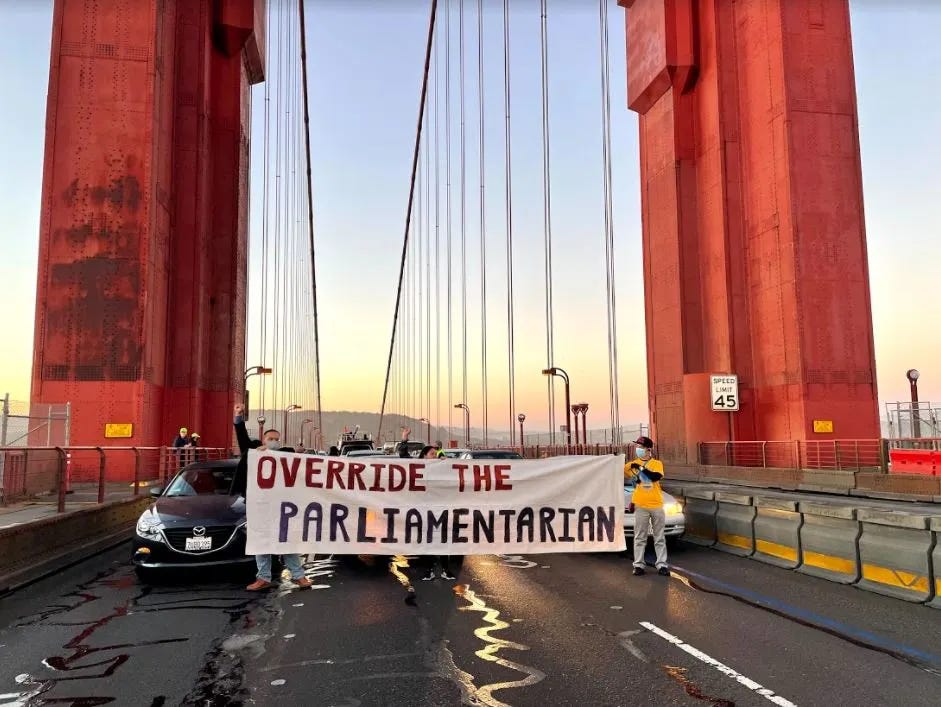The Byrd Bath Cometh: Senate Reconciliation Edition
What is the Senate's Byrd Rule and how has it affected the current reconciliation process?
Hello readers,
With all the budget reconciliation chaos surrounding the Byrd Rule and a slew of recent Senate Parliamentarian rulings, we thought we would give you a brief rundown on the what the Byrd Rule is, who decides when it applies, and examples of its use in the current Senate budget negotiations.
If you’d like to skip right to measures that have been temporarily stricken from the OBBB Act, head to Section 4.
Table of Contents
What is the Byrd Rule and why does it exist?
Measures of an extraneous nature.
Who decides if measures are extraneous?
Measures Removed from Trump’s One Big Beautiful Bill.
Let’s get started.
If you like what you read below and enjoy supporting independent journalism, consider sticking around as a free or paid subscriber! We are still running our 50% off reconciliation discount, which we have taken to calling “The Larry Bird Special.” Not the same Byrd, but a Bird nonetheless.
What is the Byrd Rule and why does it exist?

The story of the Byrd Rule begins in 1980, when an optional budget negotiations process called “reconciliation” was first used by Congress. This process was designed to save time since it allowed budget measures to bypass the Senate’s two-track filibuster (requiring a 60 vote threshold to pass most legislation), and even though it’s not required, it’s the most common form of budget negotiation in Congress today. According to the Congressional Research Service, 23 budget reconciliation bills have been enacted into law since 1980, with four being vetoed [1].
Between 1980 and 1985, many measures were included in reconciliation bills that were, frankly, irrelevant to the fiscal negotiations process [1]. It emerged as an easy way to bury presidential or congressional pet projects deep within vast fiscal measures, while at the same time, avoiding pesky things like committee jurisdiction and the ever-annoying 60-vote threshold in the Senate.
So, in 1985, the Byrd Rule was adopted by Congress and has been in use ever since [1].
Named after its initial sponsor Senator Robert C. Byrd (D-WV), the Rule is a safeguard designed to prevent “extraneous measures,” or measures that have “no budgetary purpose of effect,” from being included in budget reconciliation bills [1].
Measures of an Extraneous Nature
The Byrd Rule provides six definitions of what constitutes an extraneous measure:
[The measure] does not produce a change in outlays or revenues or a change in the terms and conditions under which outlays are made or revenues are collected;
it produces an outlay increase or revenue decrease when the instructed committee is not in compliance with its instructions;
it is outside of the jurisdiction of the committee that submitted the title or provision for inclusion in the reconciliation measure;
it produces a change in outlays or revenues which is merely incidental to the non-budgetary components of the provision;
it would increase the deficit for a fiscal year beyond the "budget window" covered by the reconciliation measure; and
it recommends changes in Social Security [1].
If a measure is determined to violate the Byrd Rule, it’s not necessarily thrown out completely; it would just require the usual 60-vote threshold to pass (which, in many cases, is akin to throwing it out completely). Reconciliation bill caveats can also be tweaked and sent back to the Parliamentarian for further review, which is something we are seeing with the current reconciliation process [1].
Who decides if something is extraneous?

After the various Senate committees finish examining and tweaking budgetary measures, they are sent to the Senate Parliamentarian [2]. Since 2012, this has been Elizabeth MacDonough – the 6th Parliamentarian overall and the first woman to hold the office [2].
Over the years, MacDonough has received praise and respect for her knowledge of Senate workings.
For example:
Sen. Mitch McConnell (R-SC) said: “She is a brilliant lawyer, a thorough and fair referee and a walking encyclopedia of Senate precedent and procedure” [5].
Sen. Bernie Sanders (I-VT) said: “She’s very solid. She listens to all the evidence” [5].
Sen. John Thune (R-SD), current Senate Majority Leader, said: “she's very steeped in the traditions of the Senate and understands how it works here” [2].
Former Sen. Richard Shelby (R-AL), said: “she’s smart, diligent ... and she's got integrity” [2].
Sen. Mark Warner (D-VA), vice chair of the Senate Intelligence Committee, said that he has: “no question about her ability to read the rules and make the right decisions” [2].
One can glean from these quotes that MacDonough is respected by a wide range of lawmakers and operates strictly “by the book.” Despite this, her rulings over the years have ruffled feathers on both sides of the aisle.
For example, when she blocked a partial repeal of the Affordable Care Act in 2015, Sen. Ted Cruz (R-TX) called for her firing, infamously quoting, “the Senate Umpire works for us” [3]. In response, senior Texas Senator John Cornyn (R-TX) effectively told Cruz to calm down, stating that this would be “like firing the judge if you disagree with his ruling” [3]. In fact, Cornyn has been one of MacDonough’s staunchest defenders, saying “she's tough" and "she calls them straight down the middle” [4].
On January 6, 2021, MacDonough and her staff brought the states’ electoral certificates to safety, narrowly avoiding a mob as they broke into the Chamber [5,7].
In the same year, when MacDonough blocked a $15 minimum wage caveat from being added to Biden’s COVID-19 relief package, Rep. Ilhan Omar (D-MN) called for her firing, and other progressives, such as Reps. Pramila Jayapal (D-WA), Mondaire Jones (D-NY) and Ro Khanna (D-CA), called for her overruling, though Vice President Kamala Harris declined to do either [6].
Again in 2021 (rough year for her), MacDonough ruled against a “pathway to citizenship” measure being included in the Democrats’ $3.5 trillion dollar reconciliation bill [8]. She noted "changing the law to clear the way to (Legal Permanent Resident) status is a tremendous and enduring policy change that dwarfs its budgetary impact” [8]. Again, Democrats called for her to be overruled, and there was even a massive protest blocking the Golden Gate Bridge in San Francisco demanding for this to happen, but again, it did not come to pass [8].
Now, there are various ways to get around the Parliamentarian’s rulings, such as the increasingly-common nuclear option and, as Sen. Thune did back in May, just ignore her and the Government Accountability Office, but the vast majority of the time, her decisions are respected and followed. For now, at least.
The Current Byrd Bath
As you have probably seen in numerous sources, Senate committees are busy performing a “Byrd Bath,” or attempting to remove or modify extraneous measures before they make it to a floor vote.
In response to this, the Parliamentarian has been busy.
Measures Removed from Trump’s One Big Beautiful Bill Act.
The following is a list of “extraneous measures” removed from the reconciliation bill following MacDonough’s review. Only two of these, the SNAP benefit caveat and the AI regulatory moratorium, have been reworked to pass Byrd Rule scrutiny.
CFPB Defunding Blocked (June 20): The Senate Parliamentarian ruled that the GOP-led effort to eliminate the Consumer Financial Protection Bureau's independent funding structure was not primarily budgetary and thus violated the Byrd Rule [9]. The provision aimed to move CFPB under appropriations control, but its impact was deemed more regulatory than fiscal. No public rework has been proposed since the ruling, and unless supporters secure 60 votes, the measure remains out of the reconciliation bill [9].
PCAOB Elimination Blocked (June 20): A GOP-backed provision to eliminate the Public Company Accounting Oversight Board (PCAOB) and merge its duties into the Securities and Exchange Commission was deemed regulatory in nature and therefore violated the Byrd Rule [10]. No rework has been reported, and the measure remains inadmissible unless 60 votes can be secured [10].
Tailpipe Emissions Standards Repeal Blocked (June 20): A proposal to revoke IRA-linked emissions standards, including rollback of Biden-era EV and efficiency mandates, was struck down for being policy-driven rather than budgetary [11]. Though Senate Energy Committee leaders reportedly explored a restructured version focused on credit thresholds and permitting timelines, no version has yet been approved by the Parliamentarian [11].
AI Regulation Moratorium Approved (June 23): A controversial provision that bars new state regulations on artificial intelligence for 10 years passed Byrd Rule scrutiny after it was rewritten to tie enforcement mechanisms to existing BEAD broadband funding; instead of the House-approved blanket ban, the Senate’s version would require states to comply with the moratorium in order to receive funds for broadband services [12]. Due to this change, it has been cleared for inclusion in the reconciliation package, though due to its bipartisan unpopularity, its overall passage remains in doubt [12].
Original SNAP Cost-Share Provision Blocked: An initial Republican proposal to shift Supplemental Nutrition Assistance Program (SNAP) costs to states based on their benefit-payment error rates was struck down under the Byrd Rule [13]. The Parliamentarian found that the policy created new administrative enforcement mechanisms and penalties without a primary budgetary purpose [13]. The provision was removed from the bill, and this original version has not been reintroduced or revised for review.
Revised SNAP Cost-Share Provision Approved (June 24): In response to the blocked SNAP language, Senate Agriculture leaders rewrote the cost-sharing language. The revised version allows states to choose between FY2025 or FY2026 error rates, exempted states with rates under 6%, and removed punitive financial triggers [13]. This narrower, data-based revision was reviewed by the Parliamentarian and found to comply with the Byrd Rule, and it has now been cleared for inclusion in the reconciliation bill.
Public Land Sales Mandate Blocked (June 24): A controversial measure backed by Senator Mike Lee (R-UT) required the federal government to sell millions of acres of public land, primarily under Bureau of Land Management control but also including National Forests, Wilderness Areas and Wilderness Study Areas, and National Monuments [14]. The Parliamentarian ruled that the proposal’s effects on land management and regulatory scope outweighed its budgetary impacts, violating Byrd [14]. A revised draft narrowed the scope to BLM lands within five miles of population centers and excluded Forest Service lands, but even that version has not been cleared by the Parliamentarian as of June 26. This one is near and dear to us readers, and we will keep you updated.
NEPA (National Environmental Policy Act) Deregulation Measures Blocked (June 24): Several environmental deregulatory provisions - including exemptions from NEPA for oil and gas projects, logging roads, and mining permits - were struck down for lacking a primary budgetary purpose [15]. These provisions sought to bypass environmental review processes to speed up energy and infrastructure projects. No substantive rework has been presented yet, and the provisions remain excluded under the Byrd Rule [15].
Federal Employee Benefit Cuts Blocked (June 25): The Parliamentarian blocked proposals targeting civil service protections and retirement benefits for federal workers, citing their regulatory rather than fiscal character [16]. These provisions included tightening retirement eligibility and cutting retirement benefits, cutting federal employee pay, selling USPS electric vehicles and banning their use in USPS activities, giving bonuses to federal employees who report “wasteful activities,” federal at-will employment, and more [16]. As of now, no revised language has been submitted for review, and the measures remain outside reconciliation eligibility.
Medicaid Provider Tax & Immigration Benefit Cuts Blocked (June 26): Provisions that aimed to restrict state Medicaid financing tools (like provider taxes) and limit eligibility for children’s health programs based on immigration status were ruled out under the Byrd Rule; this is a major blow to GOP lawmakers, as they sought to take advantage of Medicaid Provider Tax changes to fund corporate and high-earner tax cuts [17]. While committee leaders are working on tweaks - particularly to reframe the provider tax language around fiscal caps - no revision has yet cleared Parliamentarian review. Like in the past, this particular ruling has caused Republican lawmakers to call for her firing or overruling, but this has not yet happened [17].
What happens next?
Since Republican lawmakers are under pressure to pass the OBBB Act by July 4, these rulings complicate the road ahead. Votes on the Senate floor are expected to start this weekend, and we will keep you posted.
Thank You
As always, thank you so much for reading the Capitol Hill Reader. We appreciate your trust and consideration.
If you liked this issue, consider sticking around as a free or paid subscriber! Either way, your support means a lot to us.
Stay safe out there readers.
Our next issue will be the weekly digest, released Saturday, June 28.
Works Cited
1.) https://www.congress.gov/crs-product/RL30862
2.) https://en.wikipedia.org/wiki/Elizabeth_MacDonough
3.) https://rollcall.com/2015/10/22/cruz-senate-umpire-works-for-us/
4.) https://www.politico.com/news/2020/01/13/john-roberts-senate-impeachment-whisperer-098050
5.) https://apnews.com/article/bills-impeachments-bernie-sanders-electoral-college-minimum-wage-8893a3f95038cac51ba66066554bcd20
6.)https://www.forbes.com/sites/andrewsolender/2021/02/26/progressive-lawmakers-call-to-overrule-fire-parliamentarian-to-raise-minimum-wage/
7.) https://www.cnbc.com/2021/01/06/electoral-college-ballots-saved-during-capitol-riots.html
8.) https://www.cnn.com/2021/09/19/politics/immigration-senate-parliamentarian-budget-reconciliation/index.html
9.) https://www.pymnts.com/news/cfpb/2025/senate-parliamentarian-deals-setback-to-proposal-to-defund-cfpb/
10.) https://www.journalofaccountancy.com/news/2025/jun/elimination-of-pcaob-cant-remain-in-budget-bill-senate-official-rules/
11.) https://www.autonews.com/regulation-safety/an-senate-republican-emissions-roadblock-0620/
12.) https://www.insideglobaltech.com/2025/06/23/senate-parliamentarian-clears-revised-state-ai-enforcement-moratorium-for-reconciliation-bill-but-passage-remains-in-doubt/
13.) https://www.politico.com/live-updates/2025/06/24/congress/senate-parliamentarian-approves-tweaked-snap-cost-share-plan-00421130
14.) https://www.latimes.com/environment/story/2025-06-24/public-lands-sell-off-halted-mike-lee
15.)https://subscriber.politicopro.com/article/eenews/2025/06/24/parliamentarian-rules-against-trove-of-energy-provisions-00419985 (PAYWALL)
16.) https://www.fedsmith.com/2025/06/25/provisions-impacting-federal-employees-at-risk-in-one-big-beautiful-bill/
17.) https://news.wttw.com/2025/06/26/key-medicaid-provision-trump-s-tax-cut-and-spending-bill-found-violate-senate-rules







Hi. Can you expound on the Parlamentarian a bit? Head slightly spinning from the deluge of SAT words.
Thank you for this very informative update.